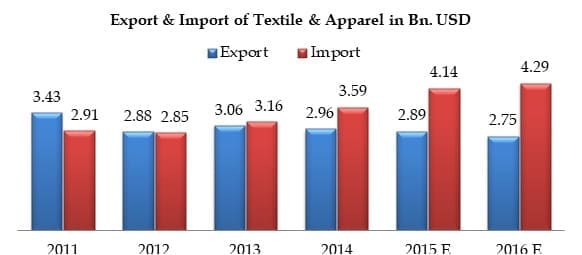My recent visit to Cairo to visit a textile exhibition “Egy Stitch Tex” has given me some eye-openers & changed my perspective of Egypt textile industry. First and foremost solid ‘mind block’ was that Egyptians only process cotton whereas found that synthetic blended material is also having bigger pie than cotton base textiles in Egypt.
Egypt known as cradle of civilization is one of the most developed & diversified economy in the Middle East. Apart from being famous for its ancient monuments & preferred as an archeological tourist destination it is also known for having a niche textile industry encompassing around 4500 companies, of which 4301 companies are operating inland and 199 companies operating in free zones with total investment of USD 6 billion.
The country is blessed with rich variety of soil & natural conditions that helps in producing the finest variety of cotton famously known as king of cotton. Egypt has become one of the largest producers of long (LS) and extra-long staple (ELS) cotton, which accounted for 50% of world production in 2008. Thevarieties of king of Cotton produced in Egypt are Ginza 70, Ginza 86 & Giza 83 having average length of about 32mm, 29mm & 26.4mm respectively with uniformity ratio ranging between 48-50%.
Over the decades I had always assumed Egypt to be a country producing cotton &only cotton. In fact throughout my textile engineering days I was fascinated by the term ‘Egyptian cotton’. However my recent visit to Egypt for the 7th international edition of Egy Stitch & Tex in Februarywas an eye openeras the Egyptian textile Industry reliesmajorly on other textile fibers with cotton contribution less than 50%.
Although the country is producing cotton recognized globally for its unmatched quality the overall production sawdecline in 2016 falling to only 320,000 bales as against 525,000 bales in 2015. The major reason for this decline is change in government reforms forcing farmers to shift cultivation towards other crops like sugarcane which faces comparatively less marketing challenges. However with recent anticipation of increase in total planted area it is estimated that total cotton production will increase by 23% accounting to 395,000 bales.
Having capability of producing fine quality of raw material the country has a vertically integrated textile & Apparel Industry with 90% of spinning & weaving companies being publicly owned whereas the private sector dominates the downstream industry with over 70 percent of garment production.
The Egyptian Textile Industry is contributing 3% to national GDP generating an employment of around 1.2 million workers& engineers, which is about 30% of industrial work force & accountable for 16% of Egypt’s non-oil & gas exports accounting to US$ 2.6 Billion.
The exports of textile & apparel industry in Egypt is around 2.75 Billion US$ in 2016 with USA, Turkey & Italy being major export partners.
As the demands for textiles is everlasting &with global shift of textile industry from European to Asian & Middle East countries there is an huge market demand for producing fine textiles. Egypt can easily en-cash on this opportunity &become one of the leading textile industry in the world. It has an added advantage of competitive labour cost compared to regional countries of North Africa & Central and Eastern Europe, Also its strategic location makes it an ideal trading hub having easy access to Europe, Asia & other Africa countries thereby reducing transportation cost thus opening doors to major markets. Moreover the easy availability of raw materials reduces the overall costing of finished products. This boost to textile industry will shift the burden of Egypt’s economy generation from majorly contributing sectors like Tourism & Agriculture.
In view of above & to further improve the socio-economic condition of Egypt by utilizing the core strength of the country’s natural resources & manpower,Government has come up with national textile strategy called Vision 2025. It is aimedto develop & establish state of art Textile city boosting the forward integration in textile & producing more & more value added end products rather than just yarns &fibers, ultimately create one million Jobs &target export of 10 billion US$.
Egypt, is all set to take bigger challenges in textile industry & show its remarkable presence in global textile market not only as a supplier of superfine raw cotton but, also as a producer of niche quality textiles. I am sure like Egyptian pyramids, textile industry will produce “wonders” in global economy.
Let us carve out…
better tomorrow!!!
by–Mr. AvinashMayekar
(MD & CEO)
Suvin Advisors Pvt. Ltd.



